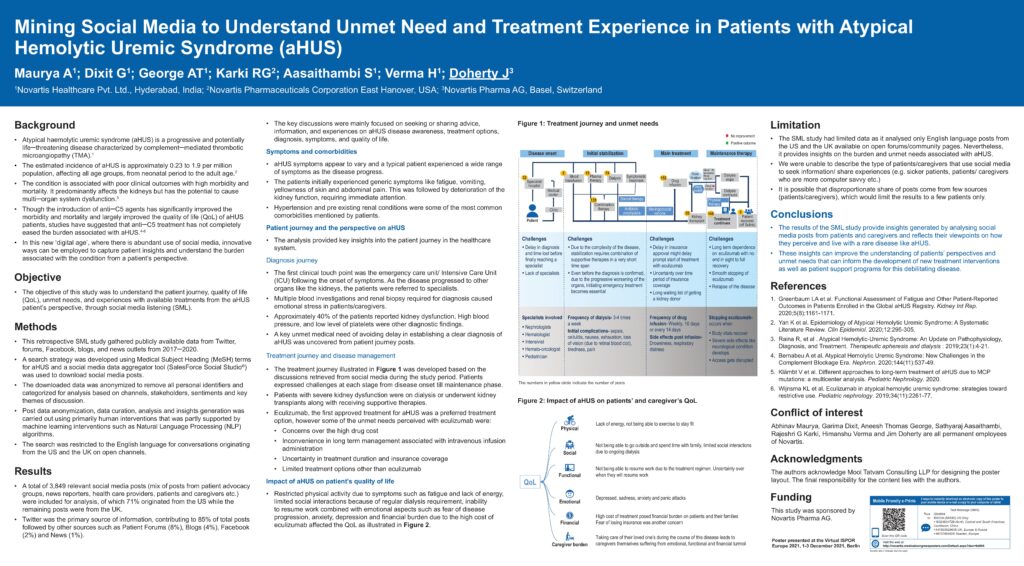Involving patients in clinical studies design and conduct is ethical (Article 575). Involving patients as subjects of that study is ethically acceptable provided informed consent is sought and attained from them to being studied.
Treating people with respect and in return getting information from them which could help all patients is commendable. Most aHUS patients would say they want to help raise awareness and understanding of their disease.
This poster about aHUS research has come to aHUS Global Action’s attention.

It was presented to a virtual conference in December 2021 held by the International Society for Pharmaeconomics and Outcomes Europe.
It is about aHUS patients but no aHUS patient, or others, knew their views were being gathered for this study. These were things these unknowing participants might have said on social media or on aHUS websites in the USA and UK.
Unlike source reference citations of research conducted by medical researchers and which this research group used in their poster, the authors give no acknowledgement to the specific social media users , forums or patient organisation websites “mined for data” . Not even an acknowledgement or a word of gratitude to those unwittingly provided them with the data to be able to conduct such research.
Let alone any informed consent by them.
That is because such data mining of the internet is a legal way of gathering information about people. Not just what they say but including their names.
The researchers say “the objective of this study was to understand the patient journey, quality of life (QoL), unmet needs, and experiences with available treatments from the aHUS patient’s perspective, through social media listening (SML)”.
Most patients would understand the need for that to be understood, and probably would, if they were asked, be happy to speak about it from their perspective.
It was done however unknown to them by gathering publicly available data from Twitter, forums, Facebook, blogs, and news outlets from 2017ꟷ2020. Only English language sources were used from USA and UK. There is no indication of which aHUS Twitter , Facebook groups or website blogs were used
The data was captured by a tool which identified terms in each person’s written statements and copied it and saved it all into a file. Almost 4000 statements were captured.
The downloaded data was anonymized to remove all personal identifiers and categorized for analysis based on channels, stakeholders, sentiments and key themes of discussion. Nothing is said about how non anonymised data was to be kept secure and for how long.
So a total of 3,849 relevant social media posts (mix of posts from patient advocacy groups, news reporters, health care providers, patients and caregivers etc.) were included for analysis, of which 71% originated from the US while the remaining posts were from the UK.
Twitter was the primary source of information, contributing to 85% of total posts followed by other sources such as Patient Forums (8%), Blogs (4%), Facebook (2%) and News (1%).
When people sign up to social media platforms Twitter and Facebook etc among the vast terms and conditions they agree to is what they write is freely available for anyone to see and use. The “ informed consent” is therefore given. The position for two sources “patient forums” and “blogs” used is unclear. Until a case in 2018 involving some breast cancer patients who had created what they thought was a closed group, it was possible for private comments to be mined along with participants names.
The results of the analysis are provided. Pretty general stuff no real benefit for patients, It was not done for them , they were not the intended audience for the findings. Findings which include misleading data, too many “ah but what about cases like…?” not mentioned and some questionable conclusions.
It compares extremely poorly to Global Action’s Global Polls 2014/2016, or research articles on the aHUS Diagnosis Process- Patients Experience and Perception where patients/carers consciously and willingly gave informed consent to participating and their information was gratefully acknowledged.
At least this research group acknowledge the limited worth of what they produced.
What Novartis did here is done by other Pharma and for other diseases too, This is not unique and quite legal if data is taken direct from social media platforms, which presumably now only includes open forums.
Anything collected from websites without the permissions included in the site’s copyright use terms and conditions would be illegal. Just as not citing something written by clinical researchers in journals would be.
This website is full of blogs, this is one, but there are terms and conditions of use.
Whilst there is nothing to say that any of the informative blogs on this website or its social media accounts ( all open) were used, with no source acknowledgement no one used for this research knows whether they were used. The only acknowledgement by this group was to the producers of the poster itself!
But that is the nub of what is wrong even if it is legal with this type of research, it is the lesser regard for individuals who unknowingly are used by profit making organisations. With AI this is going to be done more often and on a much greater scale. Much is said in the media about its use for political purposes for example.
In health studies would citing and acknowledging specific Facebook groups, Twitter accounts or websites and seeking permission not go someway to making this kind of research more acceptable to those being used by it without being informed.
Simply it is just respect for the person.
Article No. 585

